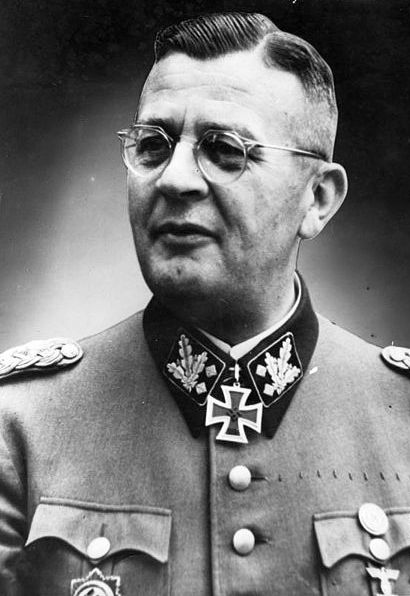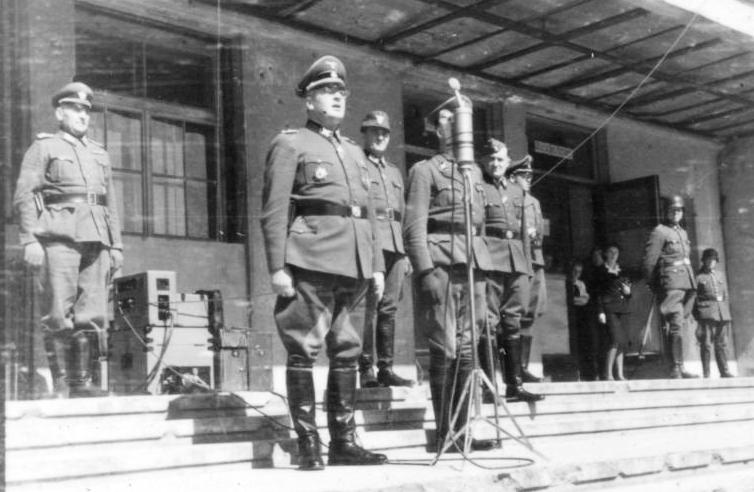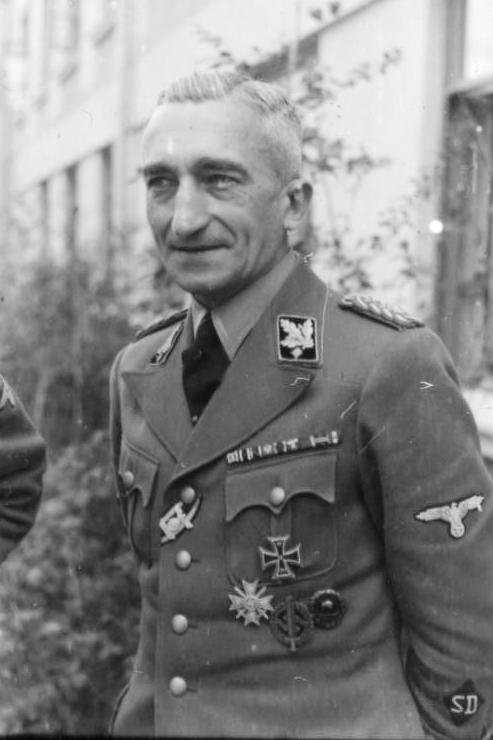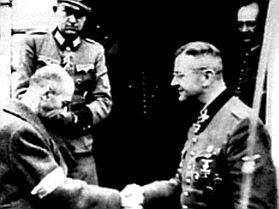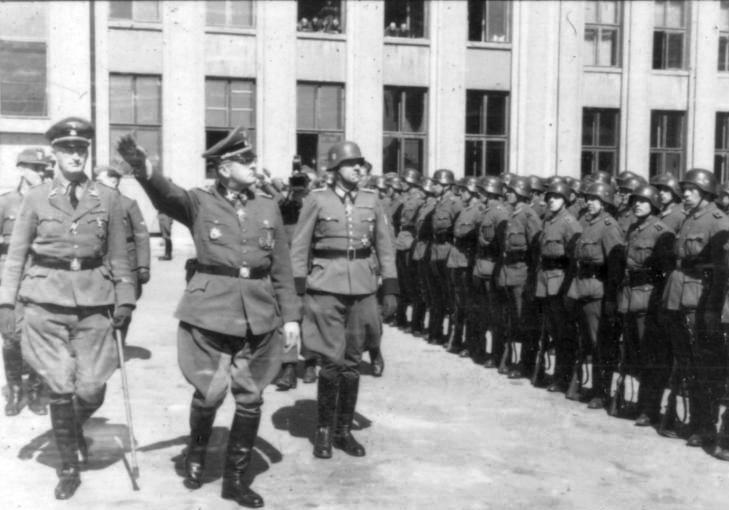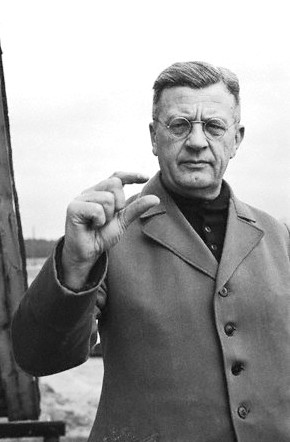Holocaust Education & Archive Research Team |
|
Einsatzgrϋppen
Einsatz Group A Einsatz Group B Einsatz Group C Einsatz Group D Babi Yar Articles Einsatz Leaders Einsatzgruppen Operational Situational Reports [ OSR's #8 - #195 ] | ||||
Erich von dem Bach-Zelewski
General of the Higher SS and Police Leader Corps, responsible for anti-partisan warfare on the Eastern Front during World War Two.
Erich von dem Bach-Zelewski was born on 1 March 1899 in Lauenburg, Pomerania. A professional soldier from a Junker military family, handsome and typically East Prussian in manner, he served in World War One, then in the Freikorps and as a Reichswehr officer. In 1924 he transferred to the border guards' units (Grenzschutz), where he remained until 1930.
After quitting the Grenzschutz he joined the German Nazi Party (I.D. card No. 489101) in 1930 and became a member of the SS in 1931. He gained rapid promotion and by the end of 1933 had reached the rank of SS-Brigadeführer.
From 1932 until 1944 he was a member of the Reichstag, representing the Breslau electoral district, and after 1934 he commanded SS and Gestapo units in East Prussia and Pomerania. It was at this point he began using his mother's maiden name "Bach", in order to sound more Germanic.
In 1939 Bach-Zelewski was promoted to the position of SS General and two years later he became a General of the Waffen-SS assigned to the Central Army Group on the Russian front until the end of 1942.
In this period Bach-Zelewski was responsible for many atrocities in which he took a personal part. On 31 October 1941 after 35,000 people had been executed in Riga, he proudly wrote: “There is not a Jew left in Estonia.”
He also participated actively in massacres of Jews in Minsk and Mogilev in White Russia, his headquarters was based in Mogilev. Himmler visited Minsk on the 15 August 1941 and witnessed an execution of Jews.
Von dem Bach-Zelewski claims to have lectured Himmler after the Minsk executions, telling him that the firing squad were now ruined for life, that they were destined to become either nervous wrecks or ruffians. After the speech Himmler, Nebe, von dem Bach and Wolff inspected an insane asylum at Novinki.
Himmler ordered Nebe to end the suffering of these people as soon as possible, yet at the same time Himmler asked Nebe “to turn over in his mind” to various other killing methods more humane than shooting. Nebe asked permission to try out dynamite on the mentally ill people.
Von dem Bach and Wolff protested that the sick people were not guinea pigs, but Himmler decided in favour of the attempt. Much later Nebe confided to von dem Bach that the dynamite had been tried on the inmates with woeful results.
Unique film of one of the gassings undertaken by Nebe at Novinki was found in Nebe’s flat in Berlin after the capitulation in 1945.
In June 1942, after the assassination of Reinhard Heydrich in Prague, Adolf Hitler wanted von dem Bach-Zelewski to take Heydrich's place as Reich Protector of Bohemia and Moravia. When Himmler argued that von dem Bach-Zelewski could not be spared due to the prevailing military situation, Hitler relented and appointed Kurt Daluege to the position.
Bach- Zelewski was in command of the German units which suppressed the Warsaw uprising in the summer of 1944, being awarded the Knights Cross in connection with these operations. The uprising concluded with the surrender of Polish General T. Bor –Komorowski to the Germans.
The negotiations began in Bach-Zelewski’s command post at Ozarow at 8am. General Bor-Komorowski did not take part himself but sent a four –strong delegation, under Colonel Iranek-Osmecki and Lieutenant – Colonel Dobrowolski. Bach Zelewski himself negotiated on behalf of the Germans, together with two police officers and an interpreter.
Later Bach wrote in his diary, “They were extremely tough negotiators, haggling over every word. They wanted to surrender as honourably as possible and obtain all guarantees to ensure their complete recognition as regulars.”
Highly regarded by Hitler for his brutality and improvisational skills – he was able to conjure armies out of very unpromising material, he ended the war as an Army Commander.
Walter Schellenberg made the following statement about Bach-Zelewski to Leon Goldensohn during the Nuremberg trials in 1946:
"But to go back to Bach-Zelewski - I think Bach-Zelewski has the kind of personality that can't differentiate between the truth and lies. He gets himself so much into the whole thing he can't differentiate. He convinces himself and believes he has gone so far that he has to die for the cause. Originally it was not the truth, but he so convinces himself - he's ready to die for it." The fact that he testified for the prosecution at Nuremburg denouncing Himmler and his own fellow police chiefs, spared him from extradition to Russia.
When examined by Col. Yuri Pokrovsky at the Nuremberg Tribunal Bach-Zelewski had the following responses:
In March 1951 he was condemned by a Munich de-Nazification court to ten years “special labour” which in practice meant being confined to his own home in Franconia. The only one among the mass murderers who publicly denounced himself for his wartime actions, he was never prosecuted for his role in the anti-Jewish massacres.
That same year Bach Zalewski claimed that he had helped Hermann Göring commit suicide in 1946. As evidence, he produced cyanide capsules to the authorities with serial numbers not far removed from the one used by Göring. The authorities never verified von dem Bach Zalewski's claim, however, and did not charge him with aiding Göring's death.
Instead he was arrested and tried in 1961 for his participation in the Rohm Blood Purge and sentenced to four and a half years, he was indicted again in 1962 for the murder of six communists in 1933.
He was tried before a jury in Nuremburg and received the unusually harsh sentence of life imprisonment. Neither indictment mentioned his wartime role, thereby suggesting that only the murder of ethnic Germans was perceived as an unpardonable crime.
Most modern day historians dismiss the von dem Bach Zalewski claim and agree that a U.S. Army contact within the prison of Nuremburg most likely aided Hermann Göring in his suicide.
He died in a prison hospital in Munich – Harlaching on 8 March 1972.
Sources:
Who’s Who in Nazi Germany by Robert S Wistrich published by Routledge, London and New York 1995 The Nuremberg War Crimes Trial, 1945-46 By Michael Robert Marrus The History of the Second World War by Purnell & Sons –London 1966 Warsaw Rising by Gunther Deschner, published by Pan Ballantine 1972 The Final Solution by G. Reitlinger – Vallentine Mitchell &Co Ltd 1953 The Nuremberg Interviews by Leon Goldensohn, Robert Gellately - History - 2004
Copyright: 2009 Victor Smart, Chris Webb & Carmelo Lisciotto H.E.A.R.T
|
